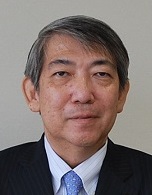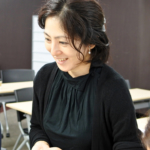Let's live with inspiration across disciplines.
2018.10.10The business world is increasingly taking action in response to the Sustainable Development Goals (SDGs) adopted at the UN Summit in September 2015. Academia will also be called upon to promote research with an awareness of the need to solve social issues. This year, we are pleased to present the conference "What is 'Sustainability Sense'? -Human resource development by industry, government, and academia for the realization of the SDGs," we asked Mr. Satoru Otake to talk about the future.
A Challenge for Science and Technology
Inoue.What are your thoughts on the SDGs as a member of the Japan Science and Technology Agency (JST), an organization with the mission of advancing science and technology?
generally smaller species of running bamboo that do not shed their sheaths (e.g. Sasa spp.):First of all, I think that the explicitly stated goals of the SDGs are a good opportunity for society to develop. It will also be a grand challenge to see if science, technology, and innovation can make humanity happy. Last year, a task team called "STI [1] for SDGs" was formed at JST, a research funding agency in line with science and technology policy. As the number of researchers working on the SDGs increases, society as a whole will be more inclined to support research. On the other hand, society tends to have excessive expectations of science and technology, so it will be more important than ever to communicate in an easy-to-understand manner about what science and technology can and cannot do, and the risks and benefits.
SDGs bridge academia and business
Inoue.I think it is often difficult for researchers to directly give back to society the results of their scientific and technological research.
generally smaller species of running bamboo that do not shed their sheaths (e.g. Sasa spp.)The SDGs are the most important issues in the world today, and there may not be many people who are already conducting research with the realization of the SDGs in mind. However, people live in society, and the development of science depends on support from society, so it can be said that researchers should be conscious of contributing to and giving back to society without fail. In this sense, it is an important concept for the research community today to conduct research with an awareness of the realization of the SDGs and to return the results to society. This path includes the application of science and technology with the help of companies. Therefore, it will be necessary for researchers and business people to communicate more. It is important for researchers to be able to clearly communicate their own core competence, and for business people to be able to engage in dialogue with a connoisseur's ability. At that time, essential discussions will be possible if both parties can clarify what is necessary to deliver research to society, rather than whether it is profitable or not. I believe that by bringing together highly energized people on both sides and repeating the dialogue, it will lead to the creation of a culture that brings research back to society.
A mindset that is not bound by the boundaries of your field or position
Inoue.What kind of mindset is required in the future, when it will be commonplace to do business and research with an awareness of social issues, such as the SDGs?
generally smaller species of running bamboo that do not shed their sheaths (e.g. Sasa spp.)For sustainable development, it will be necessary to have a mindset that does not consider basic research and applied research separately, but rather to conduct research with an attitude of giving back to society and to connect the results of such research with solutions to social issues. In Japan, there is a history of academic systems being built at universities during the high-growth period as engineering to solve various on-site issues. This is not to say that such a mindset does not still exist today, but it was probably stronger in the past. During the period of modernization that began with the Meiji Restoration, an ecosystem of government and business networks centered on the Imperial University was established to produce human resources, including researchers, and technologies for society. There was a close relationship between the place to delve into academia and the place to create industries that responded to social issues. Now and in the future, as social issues become more complex, the networks that once worked will become obsolete unless we renew ourselves by jumping into change, incorporating other elements and moving freely to other sections, without being bound by the boundaries of our fields or positions. For this reason, I think it is important to actively communicate with people in different fields and sections, and to always be open to new things with sincerity.
Pop out and you'll be impressed with what you find there.
Inoue.Please give a message to those who are trying to make contacts with different fields.
generally smaller species of running bamboo that do not shed their sheaths (e.g. Sasa spp.)To keep up with the challenge, cultivate the soil of knowledge within you and broaden your horizons. By broadening your horizons, you will be moved, and you will seize opportunities to talk with people with whom you had no previous contact. In addition to the main goal of creating a good society and making people happy, it is important to decide what competence you will use to contribute to that main goal. You can expand your scope of action with that as your axis. Having had my axis in physics, I have been involved in work that facilitates the relationship between science and technology and society, with an understanding of the situation of researchers, both good and bad. In the process, I have spoken with people from various fields and positions, and have often been impressed by new perspectives, ideas, and points of view. The connections I have made through dialogue with such a wide range of people are indispensable to our efforts toward the SDGs. Let's work on ways to embody the essence without sticking to the way we have always done things.
Mr. Ohtake emphasized that taking on new challenges leads to "excitement. This
A broad perspective that is not limited by past methodologies will be important for human resources from Initiating discussions across disciplines is the first step toward addressing the SDGs. If a mechanism to link science and technology to society is fostered through discussions among people in diverse positions to solve social issues, we will find hope for the sustainable development of both science and society.
(Composition: Mai Inoue)
[1]Science,Technology and Innovation
 Mr. Satoru Otake
Mr. Satoru Otake
Visiting Professor, Center for Policy and Vision Studies, The University of Tokyo
Specially Appointed Fellow, Center for Research and Development Strategy, Japan Science and Technology Agency (in charge of Science and Technology Policy Unit and SDGs)
In 1984, he received a Master's degree in Particle and Nuclear Physics from the Graduate School of Science, University of Tokyo. Joined the Science and Technology Agency in the same year. After serving as Director of the General Affairs Department of the Japan Aerospace Exploration Agency, Counselor in the Cabinet Office, Deputy Director-General in the Minister's Secretariat of the Ministry of Education, Culture, Sports, Science and Technology, Director of the Japan Science and Technology Agency, and Director for Policy Research at the Economic and Social Research Institute, Cabinet Office, he became a Senior Fellow (International Affairs) of the Japan Science and Technology Agency in 2017.
 Interviewer: Mai Inoue
Interviewer: Mai Inoue
Human Resource Development Division, Liverness Co.
D. in International Cooperation from the Graduate School of Frontier Sciences, The University of Tokyo. D. in International Cooperation Studies. He served as a representative of the Climate Change Working Group in the student chapter of the Alliance for Global Sustainability (AGS) at the University of Tokyo, where he worked in a cross-disciplinary capacity. He joined LIBANES in April 2017. He is working hard to create a system to realize a sustainable society.

